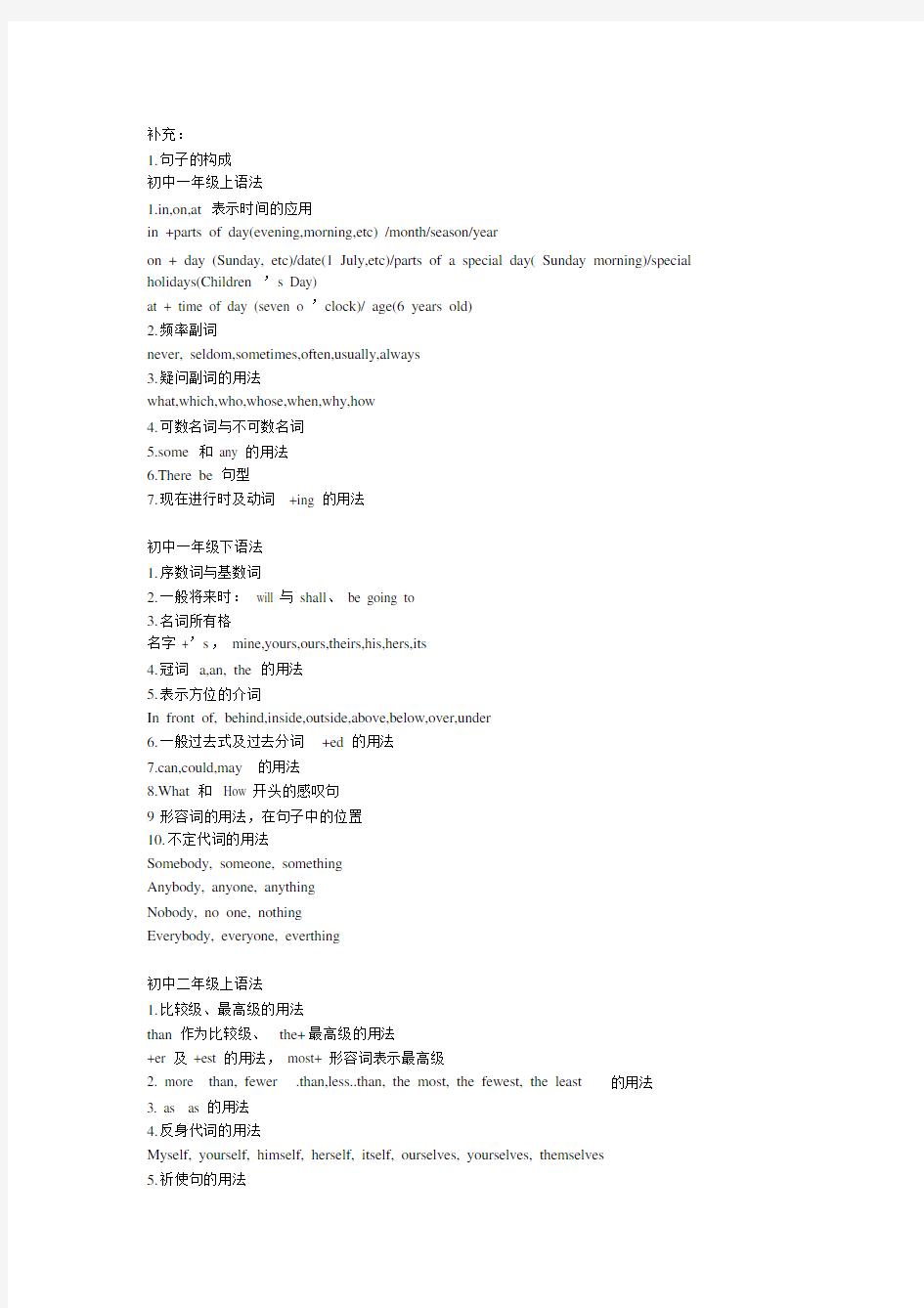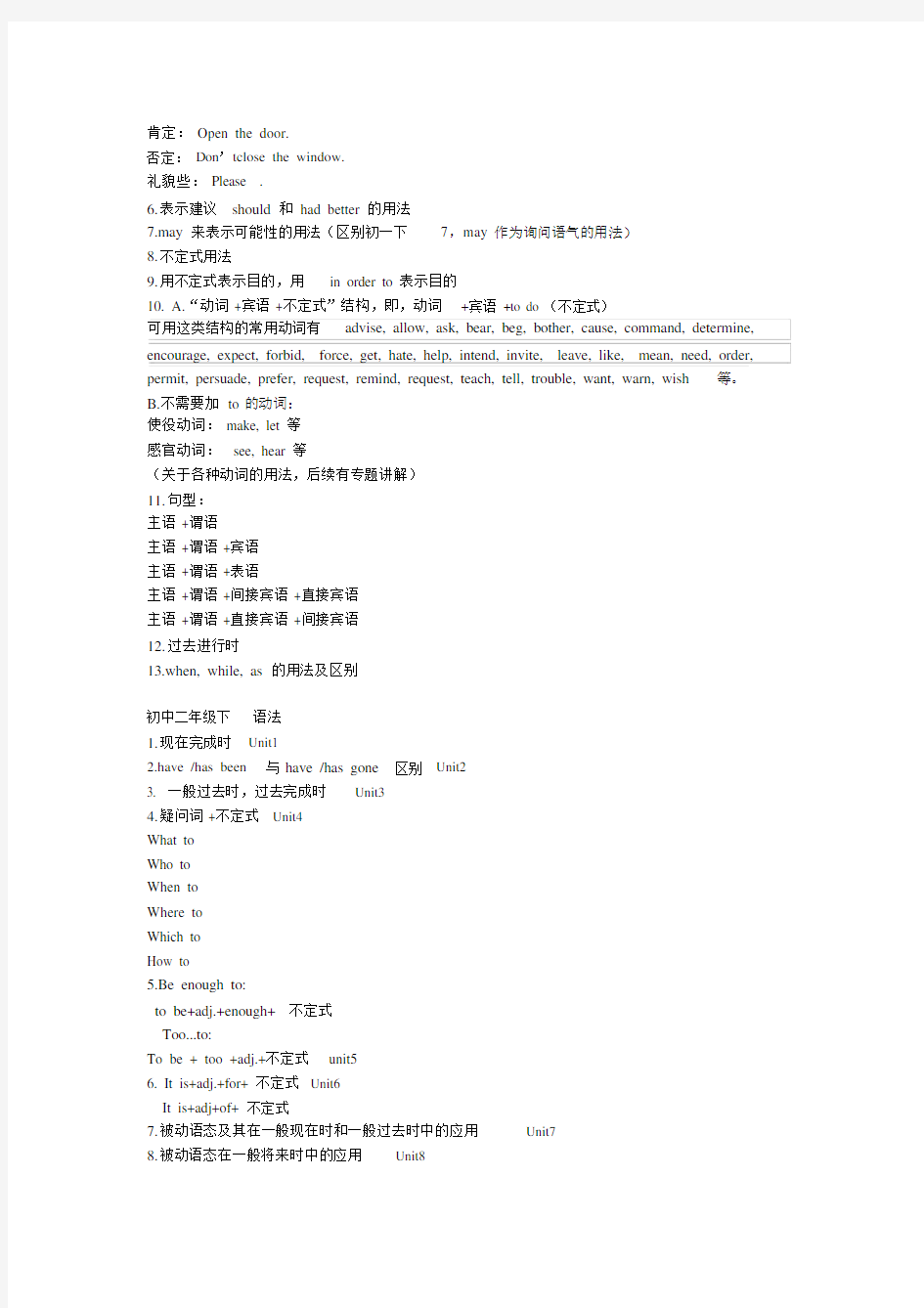(完整word版)苏教版译林牛津初中英语语法总结(初一初二),推荐文档.doc


补充:
1.句子的构成
初中一年级上语法
1.in,on,at 表示时间的应用
in +parts of day(evening,morning,etc) /month/season/year
on + day (Sunday, etc)/date(1 July,etc)/parts of a special day( Sunday morning)/special holidays(Children ’s Day)
at + time of day (seven o ’clock)/ age(6 years old)
2.频率副词
never, seldom,sometimes,often,usually,always
3.疑问副词的用法
what,which,who,whose,when,why,how
4.可数名词与不可数名词
5.some 和 any 的用法
6.There be 句型
7.现在进行时及动词+ing 的用法
初中一年级下语法
1.序数词与基数词
2.一般将来时: will 与 shall、 be going to
3.名词所有格
名字 +’s, mine,yours,ours,theirs,his,hers,its
4.冠词a,an, the 的用法
5.表示方位的介词
In front of, behind,inside,outside,above,below,over,under
6.一般过去式及过去分词+ed 的用法
7.can,could,may 的用法
8.What 和 How 开头的感叹句
9形容词的用法,在句子中的位置
10.不定代词的用法
Somebody, someone, something
Anybody, anyone, anything
Nobody, no one, nothing
Everybody, everyone, everthing
初中二年级上语法
1.比较级、最高级的用法
than 作为比较级、the+最高级的用法
+er 及 +est 的用法, most+ 形容词表示最高级
2. more than, fewer .than,less..than, the most, the fewest, the least的用法
3. as as 的用法
4.反身代词的用法
Myself, yourself, himself, herself, itself, ourselves, yourselves, themselves
5.祈使句的用法
肯定: Open the door.
否定: Don’tclose the window.
礼貌些: Please .
6.表示建议should 和 had better 的用法
7.may 来表示可能性的用法(区别初一下7,may 作为询问语气的用法)
8.不定式用法
9.用不定式表示目的,用in order to 表示目的
10. A.“动词 +宾语 +不定式”结构,即,动词+宾语 +to do (不定式)
可用这类结构的常用动词有advise, allow, ask, bear, beg, bother, cause, command, determine, encourage, expect, forbid, force, get, hate, help, intend, invite, leave, like, mean, need, order, permit, persuade, prefer, request, remind, request, teach, tell, trouble, want, warn, wish等。
B.不需要加to 的动词:
使役动词: make, let 等
感官动词: see, hear 等
(关于各种动词的用法,后续有专题讲解)
11.句型:
主语 +谓语
主语 +谓语 +宾语
主语 +谓语 +表语
主语 +谓语 +间接宾语 +直接宾语
主语 +谓语 +直接宾语 +间接宾语
12.过去进行时
13.when, while, as 的用法及区别
初中二年级下语法
1.现在完成时Unit1
2.have /has been 与have /has gone 区别Unit2
3. 一般过去时,过去完成时Unit3
4.疑问词 +不定式Unit4
What to
Who to
When to
Where to
Which to
How to
5.Be enough to:
to be+adj.+enough+ 不定式
Too...to:
To be + too +adj.+不定式unit5
6. It is+adj.+for+ 不定式Unit6
It is+adj+of+ 不定式
7.被动语态及其在一般现在时和一般过去时中的应用Unit7
8.被动语态在一般将来时中的应用Unit8
